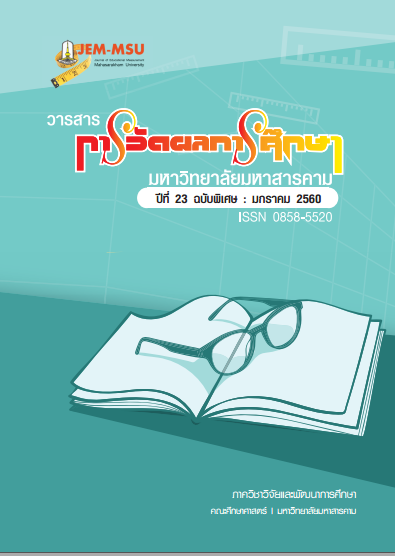Comparisons of Academic Achievement, Analytical and Achievement Motivation of Prathomsueksa 2 Students on Cluster Consonant Between Using Learning Cycle Model and the CIPPA model
Main Article Content
Abstract
The purpose of this study were : to find out a seeking efficiency and an
effectiveness index of the plans for organization of the 4MAT learning model and CIPPA
model, with a reguired efficiency of 80/80, comparisons of academic achievement,
analytical and achievement motivation of the Prathomsueksa 2 students between the
organization of learning activities using learning cycle model and CIPPA model, between
before learning and after learning, and to find out the comparisons of academic
achievement, analytical and achievement motivation of the Prathomsueksa 2 students
between the organization of learning activities using learning cycle model and CIPPA
model. The sample used in study consisted of the Prathomsueksa 2 students attending
Ban Tat Pittayakom School, in Phusing district, Srisaket Provinces in the second semester
of the academic years 2012, obtaireind using the cluster random sampling teachnique.
They were randomly to an experimental group of 20 students each in with the classroom
2/2 learned learning cycle model and group 2/2 learned the organization of the CIPPA
model. The instruments used for study comprised of : (1) 2-types of plans for organization
the learning cycle model and CIPPA model, 6 plans each, 15 hours ; (2) a 30 items of
learning achievement test with discriminating powers (B) ranging 0.22-1.00, and a reliability
of 0.73 ; (3) a 0 item of analyse thinking ability test with difficulties (p) ranging 0.42
- 0.79, discriminating powers (r) ranging 0.24 - 0.76, and a reliability of 0.68 ; (4) a 10 item
of achievement motivation test with learning mean of 2.72 and CIPPA model mean of 2.46 ;
The statistics used for analyzing data were percentage, mean, standard deviation, and
for testing hypothesis the t-test (Independent samples) was employed.
The results of the study were as follow :
1. The plans for learning cycle model and organization of the CIPPA Model
had the effectiveness indices (E1/E2) of 87.47/85.1 and 84.13/81.33 respectively.
2. The students who learned using the plans for learning cycle model showed
higher Learning achievement who learned using the organization of the organization of
CIPPA model (p< . 05)
3. The students who learned using the plans for learning cycle model showed
higher analyes thinking abilities than achievement who learned using the organization of
the organization of CIPPA model (p< . 05)
4. The students who learned using the plans for learning cycle model and who
learned using the organization of the organization of CIPPA model both of those approaches
did achievement motivation show different of mathematical connection abilities.
Article Details
The content and information contained in the published article in the Journal of Educational Measurement Mahasarakham University represent the opinions and responsibilities of the authors directly. The editorial board of the journal is not necessarily in agreement with or responsible for any of the content.
The articles, data, content, images, etc. that have been published in the Journal of Educational Measurement Mahasarakham University are copyrighted by the journal. If any individual or organization wishes to reproduce or perform any actions involving the entirety or any part of the content, they must obtain written permission from the Journal of Educational Measurement Mahasarakham University.


